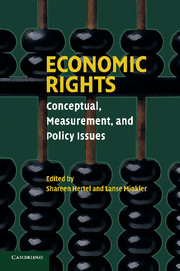Book contents
- Frontmatter
- Contents
- Contributors
- Acknowledgments
- 1 Economic Rights: The Terrain
- SECTION I CONCEPTS
- SECTION II MEASUREMENT
- 7 The Status of Efforts to Monitor Economic, Social, and Cultural Rights
- 8 Measuring the Progressive Realization of Economic and Social Rights
- 9 Economic Rights, Human Development Effort, and Institutions
- 10 Measuring Government Effort to Respect Economic and Social Human Rights: A Peer Benchmark
- 11 Government Respect for Women's Economic Rights: A Cross-National Analysis, 1981–2003
- SECTION III POLICY ISSUES
- APPENDIX 1 Universal Declaration of Human Rights
- APPENDIX 2 International Covenant on Economic, Social, and Cultural Rights
- Index
- References
9 - Economic Rights, Human Development Effort, and Institutions
Published online by Cambridge University Press: 18 December 2009
- Frontmatter
- Contents
- Contributors
- Acknowledgments
- 1 Economic Rights: The Terrain
- SECTION I CONCEPTS
- SECTION II MEASUREMENT
- 7 The Status of Efforts to Monitor Economic, Social, and Cultural Rights
- 8 Measuring the Progressive Realization of Economic and Social Rights
- 9 Economic Rights, Human Development Effort, and Institutions
- 10 Measuring Government Effort to Respect Economic and Social Human Rights: A Peer Benchmark
- 11 Government Respect for Women's Economic Rights: A Cross-National Analysis, 1981–2003
- SECTION III POLICY ISSUES
- APPENDIX 1 Universal Declaration of Human Rights
- APPENDIX 2 International Covenant on Economic, Social, and Cultural Rights
- Index
- References
Summary
INTRODUCTION
Economists are not “big” on human rights. This is particularly true for “positive rights,” which involve prescribing actions by governments, and even more so for economic rights broadly, that are interpreted to mean positive actions that enhance quality of life through redistribution or other collective actions. Economists, particularly those of the classical liberalism tradition, consider such “social justice” rights to be inconsistent with economic growth and, thus, should not be part of a country's constitution. To the extent that economists advocate for economic rights, it is usually to rights to engage in productive activities with minimal interference – or negative economic rights commonly referred to as economic freedom. To the extent that governments should prescribe policy, they should focus on the preconditions for markets to function efficiently; governments should not direct the actions of market participants. According to economists, economic freedom causes economic growth and wealth accumulation, which benefit all members of the society. Ample empirical evidence shows that economic freedom is a primary determinant of economic growth and development (Berggren 2003). Because there is strong link between economic growth and poverty reduction, economists tend to argue that positive economic rights should not be a priority if conditions for economic freedom exist. In fact, positive rights are considered counterproductive to the extent that they may infringe on economic freedom.
There is no doubt that economic growth is necessary for the improvement of the well-being of all members of the society.
- Type
- Chapter
- Information
- Economic RightsConceptual, Measurement, and Policy Issues, pp. 182 - 213Publisher: Cambridge University PressPrint publication year: 2007
References
- 6
- Cited by



